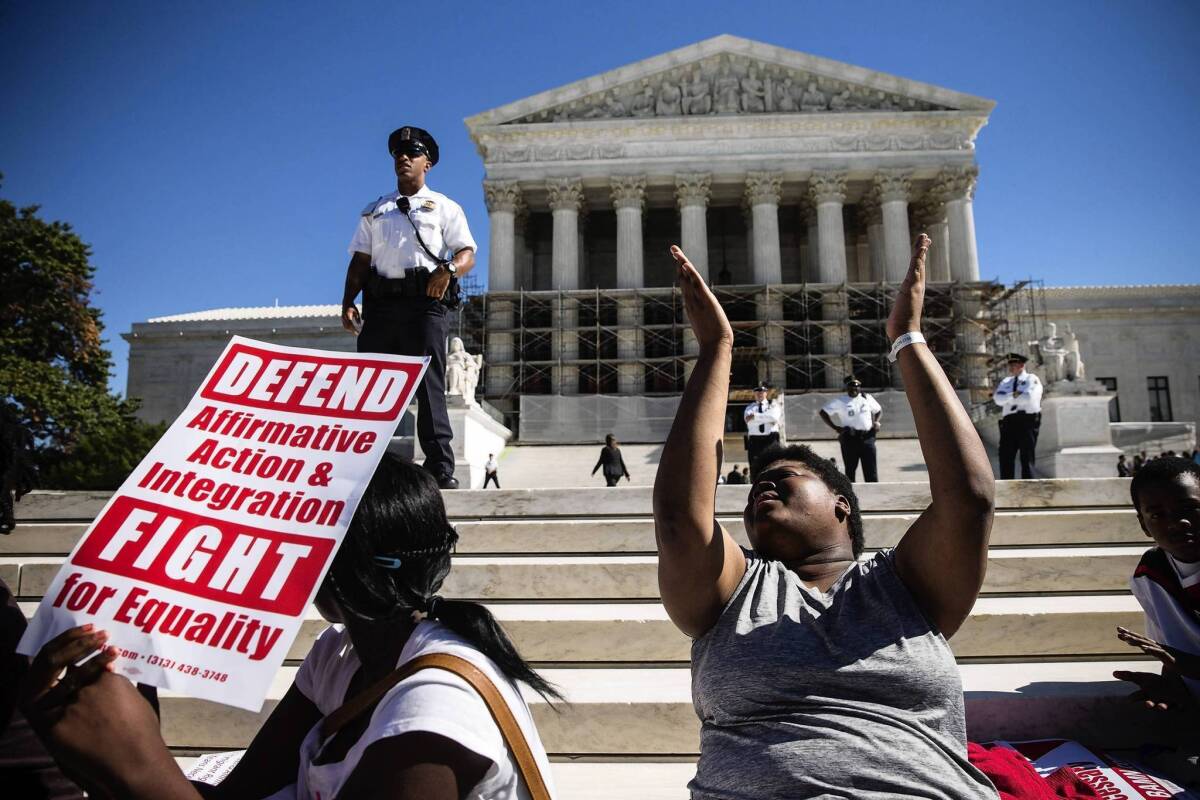Supreme Court seems to favor affirmative action ban

- Share via
WASHINGTON — The U.S. Supreme Court’s conservative justices signaled Tuesday that they were inclined to uphold California and Michigan ballot measures that forbid state universities from granting “preferential treatment” to applicants based on race.
Oral arguments on affirmative action turned into a debate over the meaning of equal treatment under the law, with the justices sounding split along the usual ideological lines. The conservatives, agreeing with Michigan’s state lawyers, said removing race as a factor led to equal treatment as required under the 14th Amendment to the Constitution. The liberals suggested that ignoring the race of blacks and Latinos stood in the way of true equality.
The Michigan measure, based on California’s Proposition 209, was struck down as unconstitutional by a federal appeals court in Ohio. That court’s ruling was based on the theory that the voters, most of whom are white, had unfairly taken away a special admissions policy that benefited racial minorities.
Michigan Solicitor Gen. John Bursch criticized the University of Michigan on Tuesday and urged the justices to support the decision of the state’s voters.
Michigan’s universities, unlike those in California and Texas, have not made an effort to enroll more students from low-income families, he said. In those two states, the top students at all high schools are guaranteed admission to a state university.
“There are other things that the University of Michigan could be doing to achieve diversity in race-neutral ways,” he said.
The ballot measure “repeals preferences,” Bursch said. “It’s an impediment to preferential treatment, not equal treatment.”
But he ran into sharp questions from liberal Justice Sonia Sotomayor, who has described herself as a beneficiary of affirmative action. Sotomayor, of Puerto Rican heritage, grew up in the South Bronx and won admission to Princeton University and Yale Law School. She excelled as a student and won top honors.
She said Michigan’s ban on affirmative action “was intended to segregate again” by screening out many minority applicants. “When you take away a tool for diversity … you are changing the playing field,” she said.
Justice Ruth Bader Ginsburg agreed that the Michigan measure was suspect. In the past, she said, the court had interpreted the Constitution’s “equal protection” clause as providing a “protection for minorities against hostile disadvantageous legislation.”
But the court’s conservatives said the clause protects everyone from racial discrimination.
“The whole point of the equal protection clause was to take race off the table,” said Chief Justice John G. Roberts Jr. Why, he asked, can’t the state’s voters say, “We want to take race off the table and try to achieve diversity without racial preferences?”
Since California’s voters approved Proposition 209 in 1996, voters in five other states, including Michigan, have adopted similar laws.
Mark Rosenbaum, an American Civil Liberties Union lawyer from Los Angeles, cited court rulings from the 1960s and ‘70s that struck down efforts by white voters to repeal civil rights measures. When voters “singled out race” as a reason to change the state law, judges should be especially wary, he said. Normally, the university faculty sets the admissions policy, he said, but voters took that authority away.
Although that argument won before the appeals court in Ohio, it appeared to gain little traction with the high court.
Most of the precedents cited during the oral argument were least 30 years old, and did not appear to have much support on the current court. Justice Anthony M. Kennedy, who has consistently voted against race-based policies, said he did not understand why state lawmakers or the state’s voters could not decide on major policies for state universities.
If the high court were to strike down the Michigan measure, it would likely spell the end for California’s Proposition 209 — the measures use the same wording. California Atty. Gen. Kamala Harris and the chancellors of the University of California system filed friend-of the-court briefs on the side of the challengers.
But to win, Rosenbaum needs the vote of at least one of the five conservative-leaning justices who constitute the majority, and it did not sound as though he had found a convert. Justice Elena Kagan sat out the case, but her recusal is not likely to affect the outcome.
More to Read
Sign up for Essential California
The most important California stories and recommendations in your inbox every morning.
You may occasionally receive promotional content from the Los Angeles Times.











